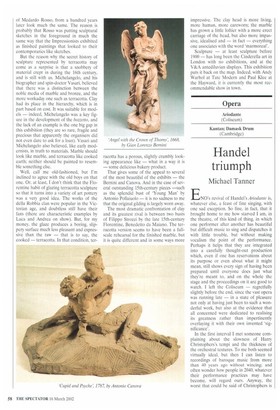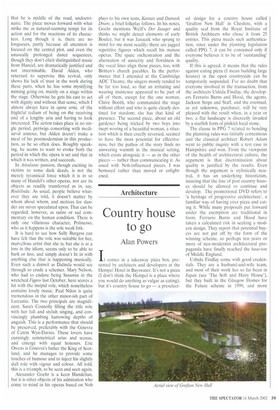Opera Ariodante (Coliseum) Kantan; Damask Drum (Cambridge)
Handel triumph
Michael Tanner
ENO's revival of Handel's Ariodante is, whatever else, a feast of fine singing, with one sad exception. So fine, in fact, that it brought home to me how starved I am, in the theatre, of this kind of thing, in which one performer after another has beautiful but difficult music to sing and dispatches it with little trouble, but without making vocalism the point of the performance. Perhaps it helps that they are integrated into a carefully thought-out production which, even if one has reservations about its purpose or even about what it might mean, still shows every sign of having been prepared until everyone does just what they're meant to, and on the whole the stage and the proceedings on it are good to watch. I left the Coliseum — regretfully slightly before the end, since the vast opera was running late — in a state of pleasure not only at having just been to such a wonderful work, but also at the evidence that all concerned were dedicated to realising its greatness rather than impertinently overlaying it with their own invented 'significance'.
In the first interval I met someone complaining about the slowness of Harry Christophers's tempi and the thickness of the orchestral textures. To me both seemed virtually ideal, but then I can listen to recordings of baroque music from more than 40 years ago without wincing; and often wonder how people in 2040, whatever their performance practices may have become, will regard ours. Anyway, the worst that could be said of Christophers is
that he is middle of the road, undoctrinaire. The piece moves forward with what strike me as natural-seeming tempi for its action and for the reactions of its characters. Long though it is, there are no longueurs, partly because all attention is focused on the central plot, and even the unusually prolonged dance sequences, though they don't elicit distinguished music from Handel, are dramatically justified and not interminable. David Alden, who returned to supervise this revival, only shows his lack of trust in the work during these parts, when he has some mystifying miming going on, mainly on a stage within the stage. Otherwise he gets his cast to act with dignity and without that sense, which I almost always have in opera seria, of the frightful tedium of being on the receiving end of a lengthy aria and having to look interested. The action takes place in no single period, periwigs consorting with mediaeval armour, but Alden doesn't make a meal of his postmodernism in this production, as he so often does. Roughly speaking, he seems to want to evoke both the period in which the opera is set and that in which it was written, and succeeds.
In Ariodante passion, though exciting its victims to some dark deeds, is not the merely tyrannical force which it is in so many of Handel's other operas, nor are its objects as readily transferred as in, say, Rodelinda. As usual, people believe whatever they are told, it doesn't matter by whom about whom, and motives for slander are never speculated upon. That can be regarded, however, as satire or sad commentary on the human condition. There is only one villainous character, Polinesso, who as it happens is the sole weak link.
It is hard to see how Sally Burgess can have felt that the role was suitable for her, marvellous artist that she is; but she is at a loss in the idiom, seems only to be able to bark or hiss, and simply doesn't fit in with anything else that is happening musically. Even such a dimwit as Dalinda would see through so crude a schemer. Mary Nelson, who had to endure being Susanna in the wretched Figaro last October, here scores a hit with the insipid role, which nonetheless contains lovely music. Paul Nilon is quite tremendous in the other minor-ish part of Lurcanio. The two principals are magnificent. Sarah Connolly filling the title role with her full and stylish singing, and convincingly plumbing harrowing depths of anguish. This is a performance that should be preserved, preferably with the Ginevra of Catrin Wyn-Davies. These lovers have cunningly symmetrical arias and scenas, and emerge with equal honours. Eric Owens is Ginevra's father the King of Scotland, and he manages to provide some touches of humour and to inject his slightly dull role with vigour and colour. All told, this is a triumph, to be seen and seen again.
Alexander Goehr is a keen Handelian, but it is other objects of his admiration who come to mind in his operas based on Noh
plays to his own texts, Kantarr and Damask Drum: a brief folkplay follows, In his notes, Goehr mentions Weill's Der Tasager and thinks we might detect elements of early Boulez, but it was Janacek who sprang to mind for me most readily; there are jagged repetitive figures which recall his mature operas. The spare orchestration and the alternation of austerity and floridness in the vocal lines align these pieces, too, with Britten's church parables. In the performance that I attended at the Cambridge ADC Theatre, the singers mostly tended to be far too loud, so that an irritating and wearing insistence appeared to be part of all of them, except for the one woman, Claire Booth, who commanded the stage without effort and who is quite clearly destined for stardom: she has that kind of presence. The second piece, about an old gardener being tricked by two boys into inept wooing of a beautiful woman, a situation which is then cruelly reversed, seemed to have the most potential for effectiveness, but the pathos of the story finds no answering warmth in the musical setting, which exists alongside it — as in the other pieces — rather than communicating it. As usual with Noh-influenced pieces, I was bemused rather than moved or enlightened.

















































































 Previous page
Previous page